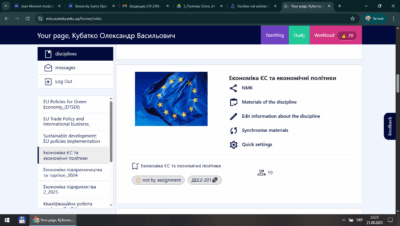During the spring semester from January 2025 to May 2025, Oleksandr Kubatko provided lectures and seminars as part of the course “EU Economy and Economic Policies” within the framework of the Jean Monnet module “Disruptive technologies for sustainable development in conditions of Industries 4.0 and 5.0: the EU Experience” (101083435 -DTSDI – ERASMUS-JMO-2022-HEI-TCH-RSCH) (2022-2025), which is currently being implemented at the Department of Economics, Entrepreneurship and Business Administration, headed by O. Kubatko.
Within the framework of the course “EU Economy and Economic Policies” the following topics were covered: Principles and theories of European integration processes (prerequisites for integration processes in Europe, sectoral integration in Europe); Socio-economic development of the EU; Economic architecture and formation of the EU (Free trade. Free trade area. Customs union. Common market. Monetary integration); Common international and trade policies in the EU. Financial and economic security in the EU; Economic implementation of the Association Agreement between Ukraine and the EU.
Students learned about the role of social prerequisites in the formation of European democratic institutions and values for the development of an EU economy. Much attention was paid to energy sustainability in the EU and its ability to confront local and global energy challenges. Students also studied normative and empirical facts about the development of European structures, institutions and their impact on economic activity. They also covered the main rules, norms and laws within the framework of the common/internal European market.

